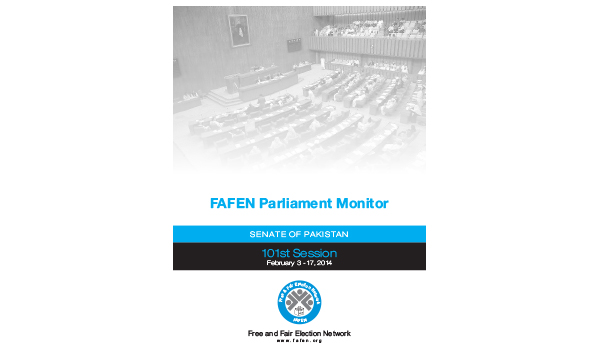Discussion on policy and constitutional matters was the main concern of Senators besides law and order situation as they spent two fifths of the session time criticizing the government on the said issues through debates, says the Free and Fair Election Network in its report based on direct observation of the Senate.
Through two Motions under Rule 218, the government received heavy criticism for its privatization policy and not pursuing Article 148(3) which directs federal government to protect its citizens. Another Motion under Rule 218 of the rules of Procedure of Senate on deteriorating law and order condition was discussed by 36 legislators; a similar issue through the same intervention was also discussed in the last Senate session. Through another motion, lawmakers proposed establishment of a full-fledged Ministry of Capital Administration and Development to deal with the subjects of health and education in the Islamabad Capital Territory as they are not properly handled in the present set up.
Senate also introduced two bills and two ordinances. Both the bills were amendments in the existing laws. The Constitution (Amendment) Bill, 2014 – proposed amendments in Article 251 of the Constitution and to give the status of national languages to Punjabi, Sindhi, Pashto, Balochi, and Saraki, which are regional languages at present with the addition of clause (1) which states “(1) the National languages of Pakistan are Urdu, Punjabi, Sindhi, Pushto, Balochi and Saraiki, and arrangements shall be made for their being used for official and other purposes within fifteen years from the commencement of this Act.” The bill also replaces some words in clause (3) of the Article 251. The Privatization Commission (Amendment) Bill, 2014 proposes greater transparency in the privatization process.
The two laid ordinances were on the security and energy issues and included the Protection of Pakistan (Amendment) Ordinance, 2014 and the Gas (Theft Control and Recovery) Ordinance, 2014.
Lawmakers participated more actively than most previous sessions as 62 of 103 Senators (current membership) took part in the 101st session. Thirty-five legislators took part in on-floor discussions, five submitted agenda items, and 22 did both.
The House adopted six resolutions – three sponsored by the MQM, two by PPPP, and one by JUI-F. The MQM sponsored resolutions regarding the need to conduct a forensic audit of Pakistan International Airline (PIA), to take effective steps for narcotics control, and to build a monitoring system for parallel justice system of jirgas. The PPPP sponsored resolutions seeking to publish the names of those judges of the superior judiciary who have dual nationality, and to amend the Official Secrets Act, 1923 to make it consistent with the constitutionally guaranteed right to information, fair trial and fundamental rights, while the JUI-F tabled a resolution on overcoming unemployment.
In five Question Hours held in the session, Senators submitted 101 questions to 27 ministries. The House took up 57 of 99 starred questions, leaving 42 un-addressed while the legislators asked 153 supplementary questions to further clarify their concerns on the taken up questions.
Forty-one percent questions directed before the House were on good governance issues where as 36% focused on economic development. Members also raised questions related to energy sector (10), terrorism and law and order (nine), democracy and political development (two), better foreign relations (two) and one on judiciary.
All of the five calling attention notices tabled in the session were taken up. Female Senators tabled three notices, while a single male lawmaker tabled another. One was tabled jointly by male and female Senators. The notices brought up varying issues such as safety threat due to construction of nuclear reactors in Karachi, resignation of Governor of State Bank of Pakistan and placement of Convention Centre, Islamabad, on the list of privatization. Non-issuance of domicile certificates to the Christian community of Federally Administered Tribal Areas (FATA) and seeking assistant from governments of United States and Afghanistan in the peace talks with Tehreek-e-Taliban Pakistan were the subject of two notices.
The Senate session had 10 sittings and it met from Feb 3 2014 to Feb 17, 2014 with an average sitting time of two hours and 22 minutes. Each sitting, on average, met 38 minutes behind schedule. In the session, although overall presence of Senators was low, it improved a bit compared to the last session of the Senate as on average, 15 Senators were present at the beginning, rising to 30 till the end and a maximum of 42 members at a point during the session.
Leader of the House showed consistency by attending all of the sittings like previous session, while the presence of Chairman and the Leader of the Opposition increased to 68% and 76% respectively. In the previous session (100th), they attended 53% and 55% of the session’s time respectively.
Senators raised 87 issues through same number of points of order which consumed four hours and 10 minutes (18%) of session’s time. Through points of order, issues related to rules of business were asked most by the Senator as it was raised 32 times in the House, followed by terrorism (22), good governance (16), peace building and conflict resolution (six), strengthening the federation (five) and law and order (two).
The Senators orchestrated five walkouts – four by the entire opposition and one by a JUI-F lawmaker. Two ANP legislators submitted two privilege motions.
For complete report click here









